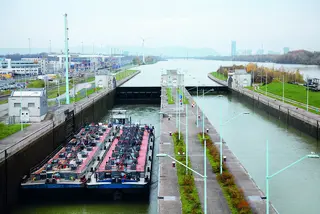Probably nobody will deny that the year 2020 was quite exceptional. A world-wide pandemic affecting our everyday lives, which was also challenging for Danube Navigation. While the cargo shipping sector was influenced by uncertain framework conditions and often changing, short-term regulations, the passenger shipping industry came to a standstill for several months because of restrictions from the public health authorities aiming to dam up COVID-19. Nevertheless, the Danube River and its economic actors were able to foster the role of the waterway as backbone for the supply of the Austrian industry, also by creating new transport flows.
Despite of travel restrictions and lockdowns, the supply of cargo needs to be guaranteed to ensure the raw material supply. Therefore, infrastructure needs to remain available, locks need to continue their efficient work and cargo vessels still need to pass borders for international transport. The year 2020 has remarkably shown, that this is possible also in difficult times.
The amount of locked-through vessel units for cargo transport reached nearly the amount of the previous year. The crew of the vessels, the port and lock operation personnel and the logistics personnel did a tremendous job to keep the cargo flows running.
In addition to the regularly conducted transports, new flows have been developed and will hopefully continue in the upcoming years:
The Port of Vienna (Hafen Wien) was able to strengthen its position as a transhipment hub for recycling products. In the year 2020, plant components and various other metal scrap was unloaded, stored and loaded on inland vessels to be shipped to Turkey. But also, other recycling materials have gained in importance: Several shiploads of waste wood have been imported from the North of Europe via inland vessel and have been discharged in the port.
The Lagerhaus Absdorf-Ziersdorf was also striking a new path for the transport of their agricultural products this year. To handle this year’s rich harvest of maize, 1.000 tons of maize have been transported directly from the field and loaded onto a ship in the Rhenus Port of Krems. 40 hours later, the corn reached its destination in Aschach (Upper Austria), was dried and ready for storage and processing. With the transport via inland vessel from Krems to Aschach 40 truck journeys have been saved.
This year, the company Pfister Consulting GmbH organised for the first-time regular shiploads of round wood via inland barge from the Rhenus Port in Krems to Hungary. This new export flows have been introduced due to the regional big volumes of wood. Especially for these high volumes, Danube Navigation can offer great opportunities and low transport costs.
All these positive examples from the cargo shipping industry underline the importance of the Danube as crisis-proof, environmentally friendly and cost-effective transport axis for the industry in Austria. The passenger shipping industry will hopefully rise quickly to their earlier performance, after the positive effects of the planned immunisation enables the usual unlimited passenger traffic. Nevertheless, these highlights at the end of a troubled year, help us at viadonau to look ahead in with optimism.

